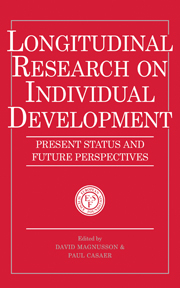Book contents
- Frontmatter
- Contents
- List of principal contributors
- Foreword
- Preface
- 1 Human ontogeny: a longitudinal perspective
- 2 Genes, experience and development
- 3 The human brain and longitudinal research in human development
- 4 Longitudinal research and a biology of human brain development and behaviour
- 5 Cognitive, social and emotional development
- 6 Developmental psychopathology: some historical and current perspectives
- 7 Developmental psychopathology as a research perspective
- 8 Longitudinal research on human aging: the power of combining real-time, microgenetic and simulation approaches
- 9 Development, aging and control: empirical and theoretical issues
- 10 Some methodological issues in longitudinal research: looking ahead
- Index
5 - Cognitive, social and emotional development
Published online by Cambridge University Press: 22 March 2010
- Frontmatter
- Contents
- List of principal contributors
- Foreword
- Preface
- 1 Human ontogeny: a longitudinal perspective
- 2 Genes, experience and development
- 3 The human brain and longitudinal research in human development
- 4 Longitudinal research and a biology of human brain development and behaviour
- 5 Cognitive, social and emotional development
- 6 Developmental psychopathology: some historical and current perspectives
- 7 Developmental psychopathology as a research perspective
- 8 Longitudinal research on human aging: the power of combining real-time, microgenetic and simulation approaches
- 9 Development, aging and control: empirical and theoretical issues
- 10 Some methodological issues in longitudinal research: looking ahead
- Index
Summary
Every developmental psychologist knows it, many developmental psychologists have explicitly said it over the years, but only a few researchers have paid attention to this fact in their own work: most of our theories of developmental change are not based on empirical study of these changes, but rather on inferences derived from studies of developmental differences between groups of subjects of different ages. It is well known that more than 90% of published data arise from cross-sectional studies; in contrast, the results from longitudinal studies play only a secondary role.
Why is developmental research so strongly dominated by cross-sectional designs? Three advantages of these designs come first to mind.
The first advantage is a pragmatic one. Modern science is in some ways like a factory for the fast and efficient production of the most data possible. Cross-sectional studies offer a very effective medium for fulfilling this requirement. All one needs for a fair chance of getting successful results is a good idea about possible developmental changes or age differences, two, three or four samples from different age groups and a relatively uncomplicated and reliable measurement that avoids floor and ceiling effects. It is only reasonable to expect that some of the many variables measured in childhood will increase with age, that no interesting age differences will be apparent in early and middle adulthood, and that mean decreases in cognitive competence, and increases in behavioural problems, occur in old age. Of course, the characterization of cross-sectional designs as just a vehicle for allowing more and more developmental psychologists to publish more and more articles is too simplistic and biased an evaluation.
- Type
- Chapter
- Information
- Longitudinal Research on Individual DevelopmentPresent Status and Future Perspectives, pp. 75 - 94Publisher: Cambridge University PressPrint publication year: 1993
- 2
- Cited by



